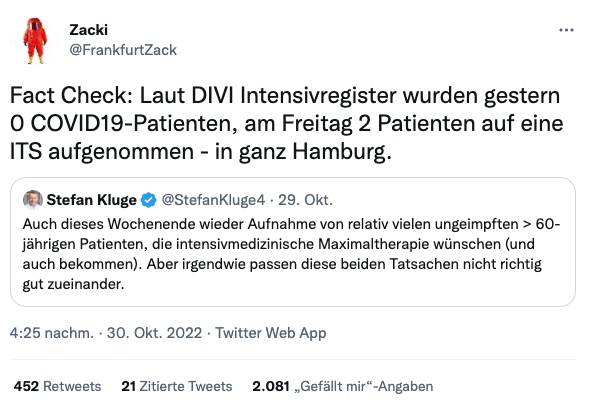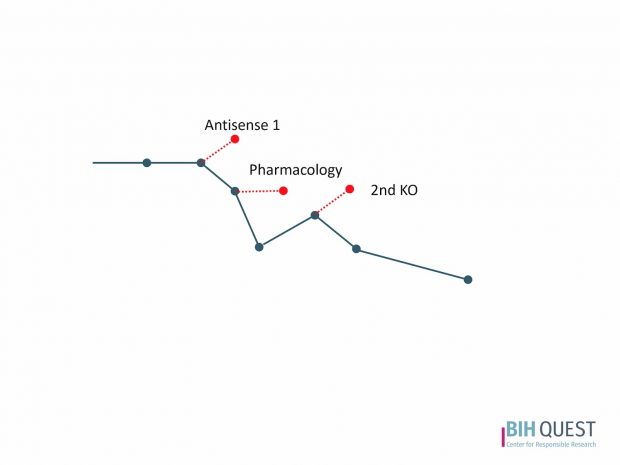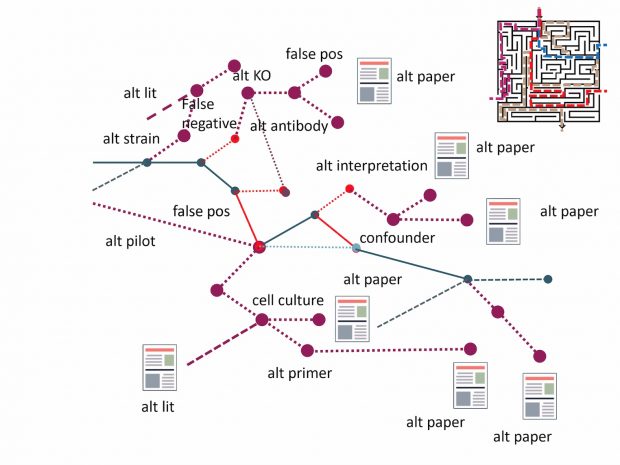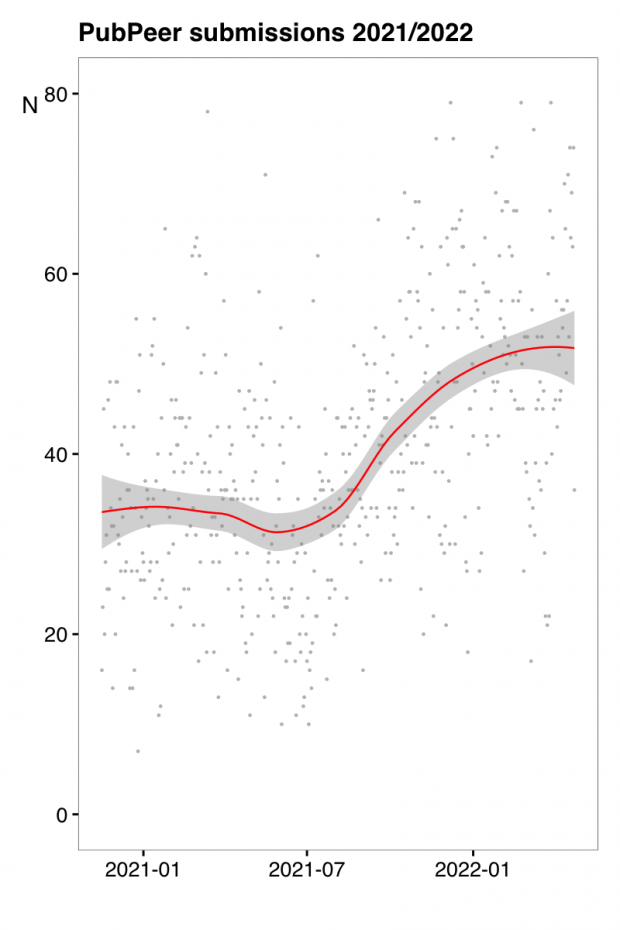 https://twitter.com/FrankfurtZack/status/1586741101322444801full thread https://archive.ph/Ewhyg
https://twitter.com/FrankfurtZack/status/1586741101322444801full thread https://archive.ph/Ewhyg
Ed Yong speaks from the bottom of my heart in his Atlantic essay “What Even Counts as Science Writing Anymore?”
Virchow’s experiences with epidemics radicalized him, pushing the man who would become known as the “father of pathology” to advocate for social and political reforms. COVID-19 has done the same for many scientists. Many of the issues it brought up were miserably familiar to climate scientists, who drolly welcomed newly traumatized epidemiologists into their ranks. In the light of the pandemic, old debates about whether science (and science writing) is political now seem small and antiquated. Science is undoubtedly political,
Tirschenreuth ist auch in der aktuellen 7.(?) Welle wieder bayrischer Rekordmeister mit einer 7 Tages Inzidenz von über 1800, wobei die Dunkelziffer wohl dreimal so hoch liegt. Continue reading Tirschenreuth IV: Fortsetzung
Time is short to secure a liveable and sustainable future; yet, inaction from governments, industry and civil society is setting the course for 3.2 °C of warming, with all the cascading and catastrophic consequences that this implies. In this context, when does civil disobedience by scientists become justified?
Not all scientists believe in never ending progress.
When I prepared a lecture last year on scientific paper writing I have found countless advices how to tell a story – it made it even into elife.
Don’t do that – there are lies and damned lies (Disraeli) while you are easily running into a trap when trying to “tell a story”. Preregister your study plan, tell the world what you did right from the beginning, what did not work, why you repeated an experiment or why changed your opinion.
Writing a story from the backend distorts the proportions and misdirects attention. Ulrich Dirnagl highlighted this problem in an earlier talk here in March using the following two slides.


Der Verlust der Glaubwürdigkeit ist das Schlimmste was einem einzelnen Wissenschaftler aber auch einer Kommission passieren kann. Das passierte der COVID19 Sachverständigenkommission (als Drosten ging und Stöhr kam). Leider passiert das auch bei der Stiko mit Mertens et al.
Leider hat das jetzt fatale Folgen, so die ersten Berichte aus der Praxis. Impfungen werden nun generell schwieriger, nicht nur bei “COVID22” sondern bei ALLEN Impfungen, obwohl deren Nutzen-Risiken-Relation unverändert ist.
Es wird immer deutlicher: https://t.co/yDws7qxLii
— KinderdocDr.med.NinaSchoetzau🌈🌻🐴 (@KinderdocNina) August 12, 2022
The recent nature editorial (1) is certainly right that medicine’s evidence pipeline need to be fixed. The COVID-19 pandemic resulted in many wasteful clinical trials that were too small to produce useful results. Also highly ranked journals damaged their reputation while we have never seen before such a wave of corrections and retractions (2).
Evidence based medicine itself failed as we needed to act fast without having any randomized clinical trial of virus spreading. The absence of evidence is not the evidence of absence. Unfortunately highly respected scientists turned out to fuel the infodemic and provided some politicians the arguments that they wanted to hear. The fundamental principles of evidence-based medicine has now some cracks as we could not decide based on studies (as we also do not have any study on the efficacy of parachutes).
We had millions of data points during the COVID-19 pandemic but we are still missing accurate surveillance. Epidemiological data from representative cohorts had the lowest funding priority, mobile communication networks were not sufficiently analysed, sequencing efforts came in only recently. Future science historians will have to decide if the pandemic could have been avoided; the extent it could have been mitigated or how treatment studies could have been better coordinated.
We are now being rescued by the progress of vaccination programs and not by a dogmatic belief system. Maybe the package insert of evidence based medicine should include a warning – not to be applied during a worldwide pandemic. It looks like we need bold changes (3).
References
1. NN. Fix medicine’s evidence pipeline. nature. 2021;593:168.
2. Abritis A, Marcus A, Oransky I. An “alarming” and “exceptionally high” rate of COVID-19 retractions. Account Res. 2021 https://doi.org/10.1080/08989621.2020.1793675
3. Morgan OW, Aguilera X, Ammon A et al. Disease surveillance for the COVID-19 era: time for bold changes. The Lancet. 2021; in press
Retractionwatch reports
Lancet‘s impact factor increased from 79.3 in last year’s report to 202.7. NEJM’s impact factor nearly doubled as well, from 91.2 to 176.1. Five other journals also had impact factors greater than 100 for the first time, and also published a lot of COVID-19 research: the Journal of the American Medical Association, Lancet Respiratory Medicine, Nature Reviews Drug Discovery, Nature Reviews Immunology, and Nature Reviews Molecular Cell Biology.
Irrelevant numbers at all – even when used with 3 decimal points precision as in an email that I received this week
COVID-19 has clearly shown the craziness of our scientific rating system.
27.11.2020 in der DMW – hier meine Meinung wiederholt
Unerwartet passiv blieben die epidemiologischen Institute und Verbände, die eigentlich NPI-Maßnahmen vorschlagen und begleiten sollten. Vorschläge zu einer bayernweiten Haushaltsstudie über zufällig ausgewählte Haus- und Kinderarztpraxen des bestehenden Influenza-Surveillance-Registers) wurden nicht verfolgt. In München wurde im März eine Studie angekündigt … allerdings gibt es Ende September keine Ergebnisse. Nationale Vorschläge einer epidemiologischen Taskforce wurden nicht aufgegriffen, ebenso wenig wie ein gemeinsames europäisches Vorgehen … Vielfach wurde deshalb die Kritik geäußert, es gleiche einem„Blindflug“, wenn NPI ohne begleitende Evaluierung durchgeführt werden, zumal NPIs mit hohen ökonomischen wie psychosozialen Kosten verbunden sind…
2 Jahre später dann die “Evaluation der Rechtsgrundlagen und Maßnahmen der Pandemipolitik. Bericht des Sachsverständigenausschußes nach § 5 ABS. 9 IFSG” am 2.7.2022 unisono
Zudem ist eine belastbare Evaluation von Interventionen während der Pandemiebekämpfung zwingend erforderlich, um die Informationen für die Anpassung, Fortführung, Weiterentwicklung oder Terminierung der Maßnahmen bereitzustellen. Im Gegensatz zum Vorgehen in einigen anderen Ländern wurde in Deutschland eine fachübergreifende Begleitforschung während der Corona-Pandemie noch nicht erreicht. So gibt es noch immer kein nationales Forschungskonzept im Bereich Public Health. Eine solch fachübergreifende Begleitforschung ist aber zwingend nötig, um Entscheidungen des Krisenmanagements auf eine bessere Wissensgrundlage zu stellen.
Welcher Epidemiologe/Epidemiologin soll es nun eigentlich richten? Der angeblich wichtigste Epidemiologe suhlt sich in Glanz früherer Tage, ein anderer erstickt in Selbstbeweihräucherung. Dazu haben sich einige im Corona Nebel verlaufen oder im Gestrüpp seiner bzw ihrer Agenda verheddert. Und der Rest? Schreibt Übersichtsartikel… Schwierig also .
Die Charité distanziert sich von Matthes und Willich
Die Charité in Berlin hat sich von Aussagen eines ihrer Stiftungsprofessoren zu Nebenwirkungen nach einer Coronaimpfung distanziert. „Die Fakultät der Charité hat die Methodik der Onlineumfrage geprüft. Hierbei wurde festgestellt, dass diese Arbeit methodische Schwächen aufweist“, teilte ein Charité-Sprecher am Freitagabend mit.
Die Thesen von Harald Matthes, Stiftungsprofessor für Integrative und Anthroposophische Medizin an der Charité, hatten vor einigen Wochen viel Aufmerksamkeit bekommen. Er hatte nach Befragungen im Rahmen seiner sogenannten ImpfSurv-Studie behauptet, dass es eine Untererfassung an Nebenwirkungen beim zuständigen Paul-Ehrlich-Institut (PEI) gebe.
Warum bringt das die Universität Bonn bei Streeck nicht fertig? Auch da lief wissenschaftlich alles schief soweit überhaupt etwas wissenschaftliches kam. Wird Wissenschaft immer mehr von parteipolitischem Interesse vereinnahmt?
Bundesbildungsministerin Bettina Stark-Watzinger (FDP) hat eine repräsentative Studie zum Immunisierungsgrad gegen Sars-CoV-2 in der Bevölkerung angekündigt. Das Bundesbildungsministerium stellt dafür drei Millionen Euro zur Verfügung … Geleitet wird sie vom Bonner Virologen Hendrik Streeck … Die repräsentative Stichprobe der Bevölkerung wird vom Umfrageinstitut Infratest dimap unter Nutzern des Bonussystems „Payback“ genommen.
Haben wir eigentlich in Deutschland keine Epidemiologen, dass man nun einem unerfahrenen Virologen eine solche Studie überlässt? Und haben wir nicht Millionen bereits für die Nako Kohorte ausgegeben aber brauchen nun “Payback” Kunden?
Eine Antwort kommt von Stefan Huster, Vorsitzender des Sachverständigenrats zur Evaluation der Pandemiemaßnahmen
Die Evaluation der Corona-Maßnahmen dürfte allerdings das Thema sein, das die Öffentlichkeit am meisten interessiert. Im Ausschuss gibt es unter den verbliebenen 17 Mitgliedern aber sechs Juristen. Ist das nicht eine aberwitzige Besetzung?
Juristischer Sachverstand ist schon wichtig, auch wenn er vielleicht etwas überrepräsentiert ist. Wir sollen nach dem gesetzlichen Auftrag ja auch Vorschläge für eine Reform des Infektionsschutzgesetzes erarbeiten. Für die Evaluation der einzelnen Maßnahmen aber war die Kommission von Anfang an zu dünn aufgestellt.
Bis zu Drostens Austritt gab es im Ausschuss immerhin drei Virologinnen und Virologen. Aber aus der Epidemiologie, deren Kerngebiet die Ausbreitung von Krankheiten ist, gab und gibt es niemanden.
Die Kommission wurde 2021 je zur Hälfte vom damaligen Bundestag und der damaligen Bundesregierung besetzt, beim Bundestag zudem nach Parteienproporz. Niemand hat die Besetzung koordiniert, das merkt man leider. Wir bräuchten neben Epidemiologen unbedingt auch mehr Manpower, um die notwendige Literaturrecherche stemmen zu können. Auch der Zeitdruck ist enorm.
Aber wie die SZ kommentiert – genau die hätte man sich von der Kommission erwartet. Epidemiologie RIP.
Learned about Michael during that concert in 2011 and are glad that he accepted afterwards to play at my birthday.
is as political, competitive, fierce, a career as you can find, full of the temptation to find easy paths (Paul Kalanithi, When breath comes air, 1977-2015)
Ntobeko Ntusi (@ntobekon) at UCT summarises challenges to science: "the temptation to find easy paths". #WCRI2022 pic.twitter.com/mqgJm6CaGg
— Matt Hodgkinson (@mattjhodgkinson) May 31, 2022
For a forthcoming article, I need some statistics to illustrate how PubPeer performs. AFAIK know there is only one report from 2021 so I had to try something by my own.

Chris Woolston writes about a new type of CV in science career
CVs have long been part of the currency of scientific promotion. Scientists seeking a position or a grant often feel obliged to list every publication, presentation and award in a single document intended to sway committees through its sheer length and volume. The typical CV follows a time-worn template, says Robert Morrell, an education researcher and former director of the New Generation of Academics Programme at the University of Cape Town in South Africa. “ ‘I was born, I went to school here, I had these publications, these are the students I graduated.’ People who write CVs like that are missing the boat.”
The UKRI is not alone in seeking to rethink the CV in response to a renewed focus on team science and equity, diversity and inclusion (EDI). It modelled its new CV format on ‘Résumé for Researchers’, introduced in 2019 by the Royal Society in London. Similar initiatives have been unveiled by research councils in the Netherlands and Luxembourg.
I wish this initiative would have come 10 or 20 years earlier…
The Royal Society template has only 4 blocks. I could fill that template in 20 minutes while for a conventional CV it would take me 2 days.